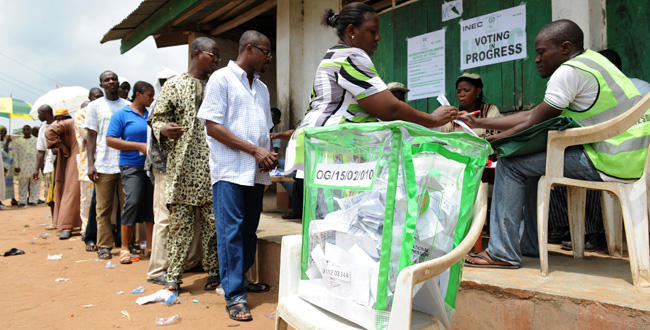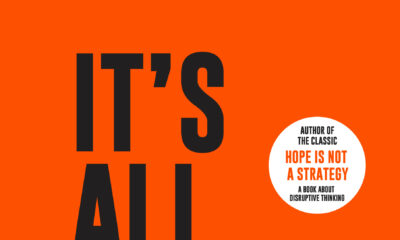Features
Mfonobong Inyang: Perspectives For A Polity Inching Towards The Polls
“If you vote in jokers, cranks, weak men, and charlatans with some gift of the garb – you run a serious risk of losing everything you have. Your future depends on what you make of it.”
=
“If you vote in jokers, cranks, weak men, and charlatans with some gift of the garb – you run a serious risk of losing everything you have. Your future depends on what you make of it” – Lee Kuan Yew.
With so much melodrama in the country, I would probably need a thousand pages to write it down. As the electioneering season becomes more animated, I developed and documented my thoughts on the state of play for some private uses, and I thought it was very instructive to share some redacted aspects publicly. One thing is apodictic: the 2023 election would be very consequential for us as individuals and as a collective. Whatever happens, it will never be business as usual again.
As more people become aware of their roles and decisively take their rightful place in the office of the citizen, the better the quality of the representation they will get. Whether by running socio-political diagnostics, listening to the chatter, or scouring through the circumstantial evidence, you will find that there appear to be three principal reasons why people will be voting and, or egging people along certain directions. Some of these motivations overlap but are all well within their constitutionally-guaranteed rights to pursue.
Please Pray For Me
For some, the next election is personal. It is their chance to be heard by delivering a referendum on those who represent their respective constituencies. Whether this motivation is driven by positive or negative experiences remains to be seen. Some voters have either spotted demonstrable competence and are rooting for certain candidates, or have enjoyed some appreciable level of good governance, and would seek to reward such representatives by contributing to their perpetuation in those public offices.
Some have been dealt a bad hand. They may have even lost loved ones and now live with survivor’s guilt. Na small thing remain, it could have been all over for them too. They have been served a cold breakfast and that’s why their feelings still dey swing jangolova. Others have been scarred by certain experiences which have exacted a great toll on them, so voting for certain persons or political parties will be considered an existential threat to their interests. This demography is essentially voting in protest, doing otherwise would amount to dancing on the graves of their dead.
Please Play For Me
For some, the next election is political. It’s also a synecdoche for identity politics which includes religion, ethnic, and other groupthink sentiments. Regardless of previous performance or prospects of power, they will still vote along certain lines. This demography comprises traditional voters and their playbook is very unlikely to change especially when they enjoy political patronage from the status quo. They are the typical base or strongholds for most politicians because they need little convincing to align with certain ideologies. What type of playing is this? It is the type that those at the top of this food chain will throw everything including the kitchen sink into play just to maintain the old order.
However, this voting bloc is guaranteed to become more nuanced in the next elections because certain unprecedented events have caused a collapse of those erstwhile impregnable walls. There is a subset of this demography who will be more fluid with their choices because identity politics hasn’t in any way protected them from the same challenges faced by those outside their enclave. The swing votes’ effect: some trees in the forest community have gotten tired of voting for the axe-head simply because its wooden handle is one of them.
Please Pay For Me
For some, the next election is professional. Like we say on the very savage streets of Nigerian Twitter, some people are neither here for the oppressor nor for the oppressed. They just want to cut that cheque. They are neither here for good nor bad governance, their interest is majorly economic even though it’s not limited to that. Some will take certain positions on key issues, not out of personal conviction but just to fly a kite and as a posturing card with the hopes of being “carried along” if things pan out a certain way. For these people, it’s all business.
You don’t need to be told, most people have agenda to push and it’s well-oiled machinery, so whilst you’re outchea trying to present superior arguments, they are religiously committed to misunderstanding, misrepresenting, and misconstruing your views. It is part of their KPIs. This is one of the things that happens during election season all over the world, so it’s not exclusive to us. The game is the game. American political activist, Upton Sinclair, brilliantly described this business model, “it is difficult to get a man to understand something when his salary depends on his not understanding it.”
“Independent”
The overwhelming desire by more electorates to actively participate in next year’s general elections is commendable; it’s a marked departure from the historical lack of enthusiasm that has seemingly greeted previous elections. People are smartening up to the notion that elections have consequences and decisions by public office holders have real implications in their personal lives. The Independent National Electoral Commission (INEC), amongst other critical stakeholders, for the most part, has complained about voter apathy, an abysmal signature that has plagued our electoral culture. Today, we seem to have an upsurge in voter registration and many things are responsible for that but I will narrow it down to three:
- The fire brigade approach
Most Nigerians have a very interesting habit of waiting until the 11th hour before making important decisions. I know this because I am on this table myself. We have seen this happen with similar calls-to-action that were ignored for the longest time only for the gatekeepers to be flooded with last minutes submissions. Notwithstanding, INEC should have factored this into its operations, seeing as it’s a cultural phenomenon that transverses different national sign-ups.
- Emergence of credible candidates
This is a straightforward rationale. When people have been serially disappointed by those they previously elected, a natural cynicism grows over time and except they are self-motivated citizens, they will not cross seven seas and seven mountains to exercise their democratic franchises. Candidates that inspire a sense of hope have a direct correlation to a spike in voter enthusiasm – it’s a very important causality.
- Technical and administrative glitches
This refers to the inability of a gatekeeper, like the electoral body, to efficiently superintend the process of registration, relocation, and collection of permanent voters’ cards. If this process is ineffective, owing to political, social, economic, or bureaucratic bottlenecks, there will be an undue amount of people thronging registration centres, which may lead to their being systematically disenfranchised by the institution. More people seem to have confidence that their votes will “count” this time owing to certain improvements in the amended electoral law. INEC should endeavour not to bungle this goodwill reposed in it.
However, we must know how best to manage an overwhelming situation just as we have decried underwhelming situations. A sprinkle of emotional intelligence ear and dear which includes two major domains, such as social awareness and relationship management, will do the magic. It is one problem when voters refuse to show up for the polls but it’s a different kind of problem when they are willing to vote but can’t do so. This is a very critical point to note because the endgame of an election isn’t just to declare winners but, more importantly, to confer legitimacy which is an intangible asset for nation-building. The three major stakeholders in every election – the political parties and their candidates, the electorates, and the electoral body – all have to be winners.
According to provisions of the extant electoral laws, the decision by INEC to set a deadline for continuous voter registration is largely discretionary. This means that any date earlier than 90 days before the elections isn’t statutory but is a prerogative of the electoral umpire. Section 9 of the amended Electoral Act “The Commission shall compile, maintain, and update, continuously, a National Register of Voters” suggests that there is more wiggle room before the polls. It’s great that INEC has extended the registration window to allow more people to have a say in the leadership recruitment exercise regardless of whatever the extra cost is. At the end of the day, INEC has only one job every four years so excuses are hard to swallow. By ensuring that the process is hitch-free, especially across certain territories, INEC, would have washed its hands and will be seen to be guiltless. We cannot tell people to eschew violent agitation on the one hand but not give them a non-violent option. Like the iconic John Lewis once stated, “The vote is the most powerful non-violent tool we have in a democratic society.”
Selah.























